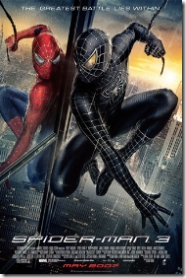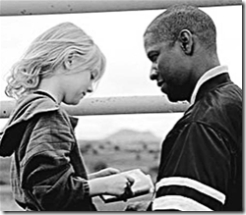 Spider-man 3 has already broken numerous box office records, both in the United States and abroad. With little wonder, too. This third installment to the “greatest comic book series in movie history,” although filled with some of the most spectacular special effects you’ve ever seen, does not go the way of typical summer blockbusters in dazzling audiences’ senses while neglecting their hearts and minds. While undeniably dazzling, Spider-man 3 also teaches some of the best lessons I’ve seen in a major Hollywood production.
Spider-man 3 has already broken numerous box office records, both in the United States and abroad. With little wonder, too. This third installment to the “greatest comic book series in movie history,” although filled with some of the most spectacular special effects you’ve ever seen, does not go the way of typical summer blockbusters in dazzling audiences’ senses while neglecting their hearts and minds. While undeniably dazzling, Spider-man 3 also teaches some of the best lessons I’ve seen in a major Hollywood production.
The movie is replete with Christian themes. The primary storyline (as anyone who has watched the fantastic trailer over and over again will know) centers around Peter Parker’s struggle with his “darker side,” trying to keep his anger and desire for revenge under control. The movie could have easily gone downhill from there, letting Spider-man become a darker “hero” by embracing his new dark power. The thing that makes this movie (and the other two Spider-man movies) worthwhile, however, is that Spider-man overcomes his weaknesses. As World Magazine notes, Spider-man isn’t like Superman (who has a child out of wedlock) or the super sexy X-men; rather, Spider-man (unlike so many modern superheroes) is a real hero. He’s human and he struggles, but in the end he makes the right choices and is a noble character. Forgiveness, self-sacrifice, and waiting until one is ready for marriage are just a few of the other important messages that this movie conveys while keeping you splendidly entertained. It is definitely a rousing finale to this series’ initial trilogy and, I must say, I won’t be disappointed to see future sequels, as long as the series keeps its positive trend.
And now, I have something of a confession to make. At times, after watching a really great movie, I tend to be rather down afterwards. It’s not like I’m depressed or sad about it — oftentimes this happens after the happiest movies. Some examples would be The Return of the King, Pride and Prejudice, the Love Comes Softly series, and now Spider-man 3. Initially I put this dull aching that comes after watching these movies down to sundry little reasons — my want for romance (after watching Love Comes Softly) or my desire to go and live an adventure (after watching The Lord of the Rings, of course). I guess I could also contribute this ache after watching Spider-man to my infantile wish to be a superhero (or my wish that there were superheroes). But after analyzing it most of today, I think I’ve solved the mystery. This ache comes from wanting something more in the world — wishing that we could have happy endings like we see in the movies, wishing that there were superheroes, wishing that all would turn out well in the end. Basically, it’s a longing for Good. Because that wish can’t really be fulfilled here, the denied want becomes a subtle pain, or one that can even be sharp at times. I call this “post super good movie syndrome.” C. S. Lewis called it Joy. I think that any movie that inspires this Joy in us, as Spider-man 3 did in me, is definitely worth watching.
The Lord of the Rings, of course). I guess I could also contribute this ache after watching Spider-man to my infantile wish to be a superhero (or my wish that there were superheroes). But after analyzing it most of today, I think I’ve solved the mystery. This ache comes from wanting something more in the world — wishing that we could have happy endings like we see in the movies, wishing that there were superheroes, wishing that all would turn out well in the end. Basically, it’s a longing for Good. Because that wish can’t really be fulfilled here, the denied want becomes a subtle pain, or one that can even be sharp at times. I call this “post super good movie syndrome.” C. S. Lewis called it Joy. I think that any movie that inspires this Joy in us, as Spider-man 3 did in me, is definitely worth watching.


 So does the fact that his bloody work is necessary justify what Creasy does? Probably not. But then, the Bible does command that
So does the fact that his bloody work is necessary justify what Creasy does? Probably not. But then, the Bible does command that 


 The reason for my rejection of this movie as a favorite in spite of its inherent quality is because of the ideas it presents. As I expected, the movie is a sort of political statement against right-wing, conservative Christians. Homosexuals are portrayed as an oppressed minority that (in the not-too-distant future) will be slain en masse as a result of the government’s loathing of these people. Also, my brother made the keen observation that the symbol of the ruling government in the movie (which he claimed is representative of the Bush administration) is nothing more than a double cross (see image above right). A coincidence? I think that doubtful.
The reason for my rejection of this movie as a favorite in spite of its inherent quality is because of the ideas it presents. As I expected, the movie is a sort of political statement against right-wing, conservative Christians. Homosexuals are portrayed as an oppressed minority that (in the not-too-distant future) will be slain en masse as a result of the government’s loathing of these people. Also, my brother made the keen observation that the symbol of the ruling government in the movie (which he claimed is representative of the Bush administration) is nothing more than a double cross (see image above right). A coincidence? I think that doubtful.